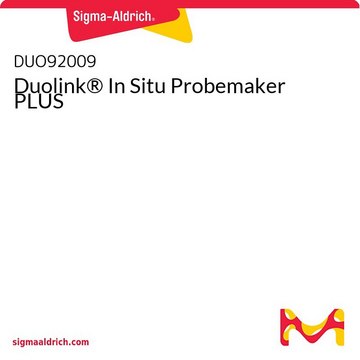おすすめの製品
由来生物
mouse
抗体製品の状態
purified antibody
抗体製品タイプ
primary antibodies
クローン
63-90, monoclonal
化学種の反応性
squid, rat, mouse
包装
antibody small pack of 25 μg
テクニック
immunohistochemistry: suitable (paraffin)
immunoprecipitation (IP): suitable
western blot: suitable
アイソタイプ
IgG1κ
NCBIアクセッション番号
ターゲットの翻訳後修飾
unmodified
遺伝子情報
rat ... Klc1(171041)
詳細
Kinesin light chain (UniProt: P37285 and B2GV74 for KLC1 and KLC2, respectively) is encoded by the Klc1/Klc2 (also known as Klc, Kns2) gene (Gene ID: 171041/309159) in rat. Kinesin is a microtubule-associated force-producing protein that may play a role in organelle transport. The kinesin light chain (KLC) may function in coupling of cargo to the heavy chain or in the modulation of its ATPase activity. Kinesin light chain 1 is expressed in the brain tissue and exists as an oligomeric complex of two heavy and two light chains. It also contains six tetratricopeptide repeats (TPR). The heavy chains of kinesin have a microtubule-binding ATPase motor domain at their amino terminus, a neck coil, and an extended series of coiled coils, separated by a hinge region, that results in heavy-chain dimerization. Kinesin light chains can associate with the heavy-chain coiled coils at the carboxyl-terminal region. The light chains bind cargoes and regulate its activity. KLCs through their TRP repeat domains can recognize shirt linear peptide motifs found on cargo proteins. In the absence of any cargo binding, kinesin-1 exists in a folded compact state, which prevents unnecessary cycles of ATP hydrolysis. However, in the cargo-bound active state inhibition is relieved and it adopts a more elongated structure that can hydrolyze ATP and translocate along microtubules. Point mutations in Klc gene can affect functional domains in kinesin, which can result in late-onset dying-back neuropathies in sensory or motor neurons. (Ref.: Yip, YY., et al. (2016). Proc. Natl. Acad. Sci. USA 113(9); 2418-2423; Pigino, G., et al. (2009). Proc. Natl. Acad. Sci. USA 106(14); 5907-5912).
特異性
Clone 63-90 detects both KLC1 and KLC2. It targets an epitope with in the N-terminal region.
免疫原
Purified rat brain Kinesin light chain 1.
アプリケーション
Research Category
細胞骨格
細胞骨格
Anti-Kinesin Light Chain, clone 63-90, Cat. No. MABT1489, is a mouse monoclonal antibody that detects Kinesin light chain and has been tested for use in Immunohistochemistry (Paraffin), Immunoprecipitation, and Western Blotting.
Immunohistochemistry (Paraffin) Analysis: A 1:50 dilution from a representative lot detected Kinesin Light Chain in rat cerebral cortex tissue sections.
Western Blotting Analysis: 4 µg/mL from a representative lot detected Kinesin Light Chain in rat brain tissue lysate.
Immunoprecipitation Analysis: A representative lot immunoprecipitated Kinesin Light Chain in Immunoprecipitation applications (Stenoien, D., et. al. (1997). Mol Biol Cell. 8(4):675-89).
Immunohistochemistry Analysis: A representative lot detected Kinesin Light Chain in Immunohistochemistry applications (Rahman, A., et. al. (1998). J Biol Chem. 273(25):15395-403).
Western Blotting Analysis: A representative lot detected Kinesin Light Chain in Western Blotting applications (Rahman, A., et. al. (1998). J Biol Chem. 273(25):15395-403; Stenoien, D., et. al. (1997). Mol Biol Cell. 8(4):675-89; Pigino, G., et. al. (2009). Proc Natl Acad Sci U S A. 106(14):5907-12; Pigino, G., et. al. (2003). J Neurosci. 23(11):4499-508).
Western Blotting Analysis: 4 µg/mL from a representative lot detected Kinesin Light Chain in rat brain tissue lysate.
Immunoprecipitation Analysis: A representative lot immunoprecipitated Kinesin Light Chain in Immunoprecipitation applications (Stenoien, D., et. al. (1997). Mol Biol Cell. 8(4):675-89).
Immunohistochemistry Analysis: A representative lot detected Kinesin Light Chain in Immunohistochemistry applications (Rahman, A., et. al. (1998). J Biol Chem. 273(25):15395-403).
Western Blotting Analysis: A representative lot detected Kinesin Light Chain in Western Blotting applications (Rahman, A., et. al. (1998). J Biol Chem. 273(25):15395-403; Stenoien, D., et. al. (1997). Mol Biol Cell. 8(4):675-89; Pigino, G., et. al. (2009). Proc Natl Acad Sci U S A. 106(14):5907-12; Pigino, G., et. al. (2003). J Neurosci. 23(11):4499-508).
品質
Evaluated by Immunohistochemistry (Paraffin) in rat hippocampus tissue sections.
Immunohistochemistry (Paraffin) Analysis: A 1:50 dilution of this antibody detected Kinesin Light Chain in rat hippocampus tissue sections.
Immunohistochemistry (Paraffin) Analysis: A 1:50 dilution of this antibody detected Kinesin Light Chain in rat hippocampus tissue sections.
ターゲットの説明
~62 and 70 kDa observed for KLC1 and KLC2, respectively; 63.75 and 68.61 calculated for KLC1 and KLC2, respectively. Uncharacterized bands may be observed in some lysate(s).
物理的形状
Protein G purified
Format: Purified
Purified mouse monoclonal antibody IgG1 in buffer containing 0.1 M Tris-Glycine (pH 7.4), 150 mM NaCl with 0.05% sodium azide.
保管および安定性
Stable for 1 year at 2-8°C from date of receipt.
その他情報
Concentration: Please refer to lot specific datasheet.
免責事項
Unless otherwise stated in our catalog or other company documentation accompanying the product(s), our products are intended for research use only and are not to be used for any other purpose, which includes but is not limited to, unauthorized commercial uses, in vitro diagnostic uses, ex vivo or in vivo therapeutic uses or any type of consumption or application to humans or animals.
適切な製品が見つかりませんか。
製品選択ツール.をお試しください
保管分類コード
12 - Non Combustible Liquids
WGK
WGK 1
引火点(°F)
Not applicable
引火点(℃)
Not applicable
試験成績書(COA)
製品のロット番号・バッチ番号を入力して、試験成績書(COA) を検索できます。ロット番号・バッチ番号は、製品ラベルに「Lot」または「Batch」に続いて記載されています。
ライフサイエンス、有機合成、材料科学、クロマトグラフィー、分析など、あらゆる分野の研究に経験のあるメンバーがおります。.
製品に関するお問い合わせはこちら(テクニカルサービス)